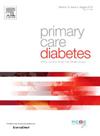Effectiveness of cardiometabolic health education interventions in populations with lower educational attainment: A systematic review and meta-analysis
IF 2.6
4区 医学
Q3 ENDOCRINOLOGY & METABOLISM
引用次数: 0
Abstract
Background
Health education is integral to cardiometabolic disease (CMD) management. Certain populations, such as people with lower educational attainment have higher risk of CMD and worse outcomes. They are also known to have differing preferences for health education formats and delivery compared with the general population. This study assessed the efficacy of CMD educational interventions in populations with lower educational attainment.
Methods
Four databases (Medline, Proquest, CINAHL, and Google Scholar) were systematically searched to identify studies using an educational intervention, targeting CMD-related outcomes, in a population with low educational attainment, in a community or primary care setting. A random-effects meta-analysis was conducted to calculate pooled mean differences.
Results
Educational interventions were associated with statistically significant improvements at approximately 3 months, compared with baseline, in terms of BMI (mean difference [95 % confidence interval] = −0.27 [-0.42, −0.12] kg/m2; p < 0.001), weight (-0.20 [-0.35, −0.06] kg; p = 0.007), % fat in diet (-2.45 [-3.08, −1.81]; p < 0.001), systolic blood pressure (-0.51 [-0.98, −0.05] mmHg; p = 0.031), total cholesterol (-0.54 [-0.70, −0.38] mg/dL; p < 0.001), HbA1c (-0.46 [-0.74, −0.17] %; p = 0.002), physical activity (1.04 [0.43, 1.66] hours/week; p < 0.001), and CES depression score (-0.72 [-1.16, −0.27]; 0.002). However, where 12 or 24 month follow-up data were available, there were no statistically significant differences compared with baseline.
Conclusion
CMD education interventions can improve multiple outcomes in the short term in people with lower educational attainment. Further work is needed around how such benefits may be maintained.
低学历人群心脏代谢健康教育干预的有效性:一项系统回顾和荟萃分析。
背景:健康教育是心血管代谢疾病(CMD)管理不可或缺的一部分。某些人群,如受教育程度较低的人患CMD的风险较高,结果也较差。众所周知,与一般人群相比,他们对健康教育的形式和提供方式有不同的偏好。本研究评估CMD教育干预在低受教育程度人群中的效果。方法:系统检索四个数据库(Medline、Proquest、CINAHL和谷歌Scholar),以确定在低受教育程度人群、社区或初级保健环境中使用教育干预、针对cmd相关结果的研究。随机效应荟萃分析计算合并平均差异。结果:与基线相比,教育干预与大约3个月时BMI的统计学显著改善相关(平均差异[95 %置信区间]= -0.27 [-0.42,-0.12]kg/m2;p 结论:CMD教育干预可在短期内改善受教育程度较低人群的多项预后。如何维持这些好处需要进一步的工作。
本文章由计算机程序翻译,如有差异,请以英文原文为准。
求助全文
约1分钟内获得全文
求助全文
来源期刊

Primary Care Diabetes
ENDOCRINOLOGY & METABOLISM-PRIMARY HEALTH CARE
CiteScore
5.00
自引率
3.40%
发文量
134
审稿时长
47 days
期刊介绍:
The journal publishes original research articles and high quality reviews in the fields of clinical care, diabetes education, nutrition, health services, psychosocial research and epidemiology and other areas as far as is relevant for diabetology in a primary-care setting. The purpose of the journal is to encourage interdisciplinary research and discussion between all those who are involved in primary diabetes care on an international level. The Journal also publishes news and articles concerning the policies and activities of Primary Care Diabetes Europe and reflects the society''s aim of improving the care for people with diabetes mellitus within the primary-care setting.
 求助内容:
求助内容: 应助结果提醒方式:
应助结果提醒方式:


